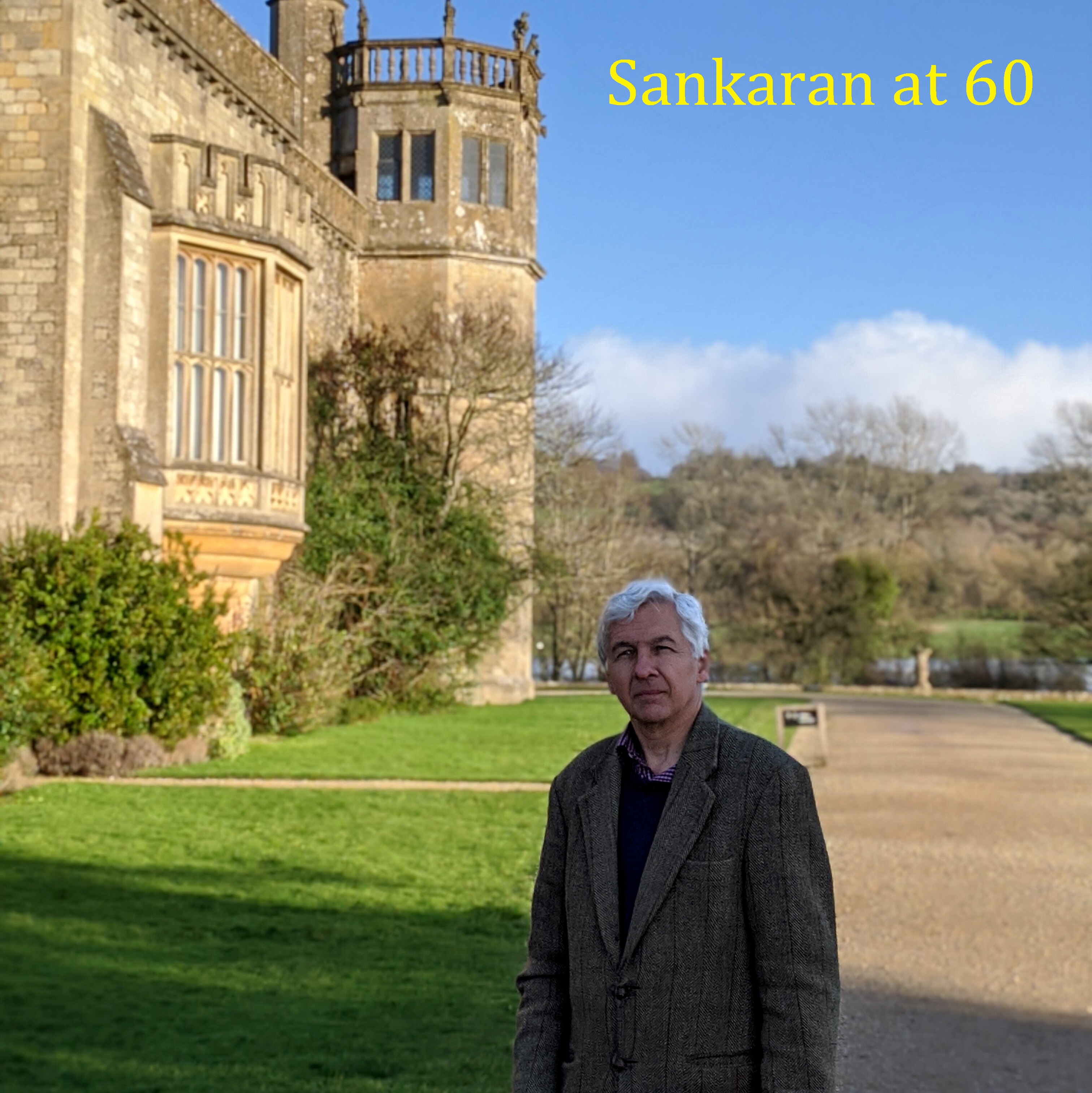Sankaran at 60
Cambridge - 21st April 2022
In (belated) celebration of the 60th birthday of Gregory Sankaran, we will be organising a special COW meeting. As many of you will know, Gregory was one of the founders of the COW and was one of its two main organisers for the first 25 years of its existence, so this seems like a fitting way to mark the occasion.
The meeting is planned to take place in person at the Centre for Mathematical Sciences, Cambridge, on 21st April 2022. The meeting will begin with lunch at 12pm, with the first talk starting at 1pm. The final talk is expected to finish at 5pm and will be followed by a reception.
As a birthday celebration, we believe that it is important that this event takes place in-person. Our current expectation is that it will be possible to run such an event in April with relatively few COVID-related restrictions and that international guests will be able to attend. If you are coming from abroad, you can check the latest rules around entering the UK at the following link.
Travelling to England from another country during COVID-19
Speakers
- Klaus Hulek (Leibniz Universität Hannover)
- Al Kasprzyk (Nottingham)
- Claire Voisin (Collège de France)
Registration
Registration has now closed. If you have not registered and still want to attend this event, please email Alan Thompson (A.M.Thompson (at) lboro.ac.uk).
Schedule
| Time | Speaker | Title |
| 12:00pm | Lunch | |
| 1:00pm | Al Kasprzyk | Exploring the landscape of Fano varieties |
| 2:30pm | Claire Voisin | A topological characterization of hyper-Kähler fourfolds of Hilb2(K3) type |
| 4:00pm | Klaus Hulek | Moduli of cubic surfaces revisited |
| 5:00pm | Reception | |
| 6:30pm | Pub dinner |
Abstracts
- Al Kasprzyk (Nottingham) - Exploring the landscape of Fano varieties
- Recent advances allow us to begin systematically mapping the landscape of Q-factorial terminal Fano varieties by drawing on ideas from mirror symmetry -- this is known as the Fanosearch programme. Mirror symmetry suggests that geometric objects come in mirror pairs: in this setting, the mirror partner to a Fano variety is a Laurent polynomial. These mirrors satisfy many beautiful combinatorial properties, and are accessible to systematic classification via the study of convex lattice polytopes. With the help of large-scale computation, we have started populating the classifications of Fano varieties in dimensions 3 and 4, finding hundreds of new Fano varieties in the process. Furthermore, techniques from data science and Machine Learning have exposed deep, previously unsuspected structure in this data.
- Claire Voisin (Collège de France) - A topological characterization of hyper-Kähler fourfolds of Hilb2(K3) type
There are two known deformations types of hyper-Kähler (HK) fourfolds, namely Hilb2(K3) (Beauville, Fujiki) and the generalized Kummer variety K2(A) (Beauville). It is however still unknown whether there are other topological types or deformation types of HK fourfolds. Some strong topological restrictions on HK fourfolds are known by work of Beauville, S. Salamon, Verbitsky and Guan. In this talk I will sketch the proof of the following result
Thm. A hyper-Kähler fourfold X is a deformation of Hilb2(K3) if and only if it has two integral degree 2 cohomology classes satisfying the conditions l4=0, m4=0, l2m2=2. In particular, a HK fourfold which is homeomorphic to Hilb2(K3) is a deformation of Hilb2(K3).
This is joint work with Debarre, Huybrechts and Macrì.
- Klaus Hulek (Leibniz Universität Hannover) - Moduli of cubic surfaces revisited
Moduli of cubic surfaces have been studied by very many authors. There are two approaches to construct these moduli spaces, namely either by GIT methods or by Hodge theory. The latter leads to ball quotient models. It is known that the (compact) GIT model and the Baily-Borel compactification of the ball quotient coincide (Allcock, Carlson, Toledo). Due to its construction, this space has two natural (partial) desingularizations, namely the Kirwan blow-up and the toroidal compactification. The main point of this talk is the observation that these compactifications have the same topology, but otherwise behave quite differently. In particular, they are not (naturally) isomorphic. We will also briefly touch on the analogue question for cubic threefolds.
This is joint work with Sebastiano Casalain-Martin, Sam Grushevsky and Radu Laza.
Funding
This event is supported by the London Mathematical Society under a Scheme 3 grant, the Heilbronn Institute for Mathematical Research under the UKRI/EPSRC Additional Funding Programme for Mathematical Sciences, and the EPRSC Programme Grant 3CinG - Classification, Computation, and Construction: New Methods in Geometry.
Some funding is available to cover travel expenses for young participants (PhD students and postdocs) travelling within the UK; please apply for this funding through the registration form below. Note that, as this is a one-day event, we will not be able to cover accommodation costs except by prior arrangement; if you plan to stay overnight and do not have your own source of funding, please email the organisers to check if we are able to cover it before you book.
Organisers
- Alastair Craw (Bath)
- Mark Gross (Cambridge)
- Anne-Sophie Kaloghiros (Brunel)
- Timothy Logvinenko (Cardiff)
- Alan Thompson (Loughborough)
This page is maintained by Alan Thompson and was last updated on 20/04/22. Please email comments and corrections to A.M.Thompson (at) lboro.ac.uk.



